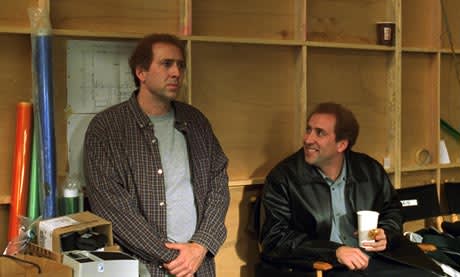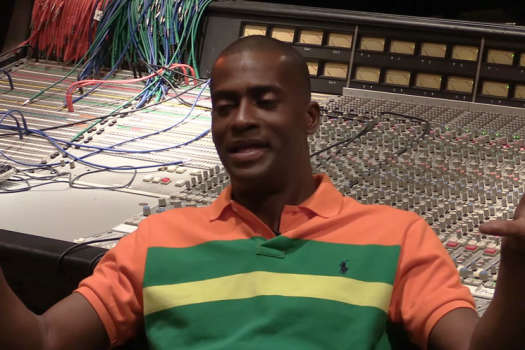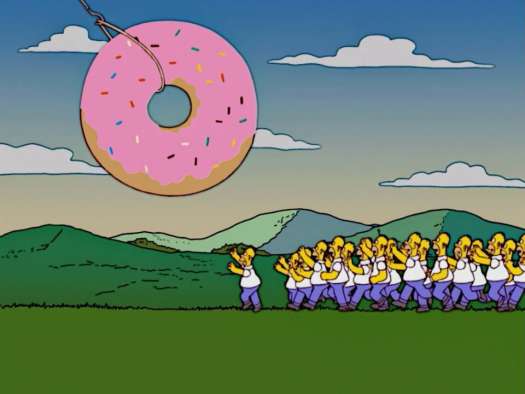The premise is a whopper. While director Spike Jonze was filming Being John Malkovich, his creative partner, writer Charlie Kaufman was hired to adapt Susan Orlean's non-fiction book The Orchid Thief for the screen. In the process of tackling the difficult material the story of a poacher of Florida orchids, flowers that ingeniously adapt to their environment, as well as Orlean's own search for passion in her life Kaufman wrote himself into his own screenplay as a character. The Jonze-directed Adaptation, out this month, chronicles the attempts of a fictional Charlie Kaufman to adapt The Orchid Thief, while he struggles with the breezy success of his also-fictional twin brother Donald. Orlean herself becomes a character in the film (played by Meryl Streep), and adding to the twists of identity, the Adaptation screenplay is credited to both Charlie and the brother he doesn't have, Donald.
"I wanted to fine-tune my craft," says Nicolas Cage, who plays both twins. More likely he was seeking a credibility resurgence after ill-advised disasters like Windtalkers and Captain Corelli's Mandolin. He's found it in Adaptation, as he embodies the nervous, insecure and overweight Charlie as well as the successful, confident and gregarious Donald.
The film deftly weaves its interlocking themes in a funny, convincing manner. It showcases Kaufman's neuroses as a writer, the challenge of adaptation (a theme that melds effectively with orchids), and is an effective, if unconventional chronicle of the book itself. "I recognise that it was a bit of a risk for me to do this," says the real Charlie Kaufman. "I considered that it was not going to be appreciated by the studio, but I didn't have any other ideas. I had to turn in something. Even though I was excited about the idea and it opened up a whole lot of other ideas for me as I implemented it, I still felt that at the end of this particular trip, I was going to have to show this to [the studio] and there was a panic about that."
The studio's first reaction? Silence. "I didn't hear from them right away," Kaufman says. "When I did, they were enthusiastic. I learned later that they weren't initially. They wanted to know who Donald was and why I had farmed out part of my script to someone else." "[The studio] had been living with this book they had hired Charlie to adapt," Spike Jonze adds. "This script was far away from that." Orchid Thief author Susan Orlean who now finds herself an active character in Adaptation also had to be won over. "Before it was given to her, she was thoroughly prepped so she wouldn't be shocked," Jonze says. "She was still shocked."
"She had to figure out if she wanted to let us use her name," Jonze explains. "In the end, she just went for it, for the experience of it. Now that she's seen the finished movie a few times, she's really supportive. She thinks it represents the themes of the book in a way that a literal adaptation couldn't."
Nicolas Cage adds his own non-literal representation of Charlie Kaufman and his fictional twin. "I adopted the understanding that this was an impression of Charlie," he says. "The Kaufman on the page. I did do a long series of interviews with Charlie, taping them, so I could use or borrow what I could of his essence his speech, some of his behaviour. In a three week rehearsal process with Spike, we sketched out the geography of the characters what made Charlie Charlie and what made Donald Donald. One of the great things about Spike as a director is that he makes sure it doesn't fall into farce or slapstick, which would have been easy to do. We tried to find ways of balancing it so that it stayed within the realm of believability."
The end result is a layered film that touches on the themes of Being John Malkovich the nature of celebrity painted with a surrealistic brush but also parallels Kaufman's obsessions with writing and Orchid Thief protagonist John Laroche's own passions. (Laroche is beautifully portrayed by underrated character actor Chris Cooper.) The result is a heady and hilarious mind-trip the likes of which is rarely seen from a major studio; in this case, the power of the Kaufman/Jonze creative team is what makes it happen. It's entertaining, yet open-ended enough to invite personal interpretation. "I don't even know why I'm laughing sometimes," Cage says. "It's like a poem you can't expect to be told what every word was supposed to mean."
"I wanted to fine-tune my craft," says Nicolas Cage, who plays both twins. More likely he was seeking a credibility resurgence after ill-advised disasters like Windtalkers and Captain Corelli's Mandolin. He's found it in Adaptation, as he embodies the nervous, insecure and overweight Charlie as well as the successful, confident and gregarious Donald.
The film deftly weaves its interlocking themes in a funny, convincing manner. It showcases Kaufman's neuroses as a writer, the challenge of adaptation (a theme that melds effectively with orchids), and is an effective, if unconventional chronicle of the book itself. "I recognise that it was a bit of a risk for me to do this," says the real Charlie Kaufman. "I considered that it was not going to be appreciated by the studio, but I didn't have any other ideas. I had to turn in something. Even though I was excited about the idea and it opened up a whole lot of other ideas for me as I implemented it, I still felt that at the end of this particular trip, I was going to have to show this to [the studio] and there was a panic about that."
The studio's first reaction? Silence. "I didn't hear from them right away," Kaufman says. "When I did, they were enthusiastic. I learned later that they weren't initially. They wanted to know who Donald was and why I had farmed out part of my script to someone else." "[The studio] had been living with this book they had hired Charlie to adapt," Spike Jonze adds. "This script was far away from that." Orchid Thief author Susan Orlean who now finds herself an active character in Adaptation also had to be won over. "Before it was given to her, she was thoroughly prepped so she wouldn't be shocked," Jonze says. "She was still shocked."
"She had to figure out if she wanted to let us use her name," Jonze explains. "In the end, she just went for it, for the experience of it. Now that she's seen the finished movie a few times, she's really supportive. She thinks it represents the themes of the book in a way that a literal adaptation couldn't."
Nicolas Cage adds his own non-literal representation of Charlie Kaufman and his fictional twin. "I adopted the understanding that this was an impression of Charlie," he says. "The Kaufman on the page. I did do a long series of interviews with Charlie, taping them, so I could use or borrow what I could of his essence his speech, some of his behaviour. In a three week rehearsal process with Spike, we sketched out the geography of the characters what made Charlie Charlie and what made Donald Donald. One of the great things about Spike as a director is that he makes sure it doesn't fall into farce or slapstick, which would have been easy to do. We tried to find ways of balancing it so that it stayed within the realm of believability."
The end result is a layered film that touches on the themes of Being John Malkovich the nature of celebrity painted with a surrealistic brush but also parallels Kaufman's obsessions with writing and Orchid Thief protagonist John Laroche's own passions. (Laroche is beautifully portrayed by underrated character actor Chris Cooper.) The result is a heady and hilarious mind-trip the likes of which is rarely seen from a major studio; in this case, the power of the Kaufman/Jonze creative team is what makes it happen. It's entertaining, yet open-ended enough to invite personal interpretation. "I don't even know why I'm laughing sometimes," Cage says. "It's like a poem you can't expect to be told what every word was supposed to mean."




